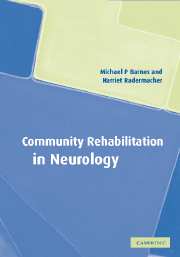Book contents
- Frontmatter
- Contents
- 1 Background to community neurological rehabilitation
- 2 Neurological rehabilitation – basic principles and models of delivery
- 3 Models of disability
- 4 Concepts of community
- 5 The views of disabled people
- 6 Outcome measures and research in the community
- 7 Evidence base for community neurological rehabilitation
- 8 Lessons from the south
- 9 Other aspects of community neurological rehabilitation
- 10 Community rehabilitation in childhood: concepts to inform practice
- 11 Neuropsychological rehabilitation in the community
- 12 The way forward
- Index
- References
4 - Concepts of community
Published online by Cambridge University Press: 11 August 2009
- Frontmatter
- Contents
- 1 Background to community neurological rehabilitation
- 2 Neurological rehabilitation – basic principles and models of delivery
- 3 Models of disability
- 4 Concepts of community
- 5 The views of disabled people
- 6 Outcome measures and research in the community
- 7 Evidence base for community neurological rehabilitation
- 8 Lessons from the south
- 9 Other aspects of community neurological rehabilitation
- 10 Community rehabilitation in childhood: concepts to inform practice
- 11 Neuropsychological rehabilitation in the community
- 12 The way forward
- Index
- References
Summary
Overview
What life have you if you have not life together? There is no life that is not community.
(T. S. Eliot, choruses from The Rock)An understanding of the concept of community will be useful for two reasons. First, by clarifying what the term means in isolation, it will provide a framework from which we can begin to understand what rehabilitation in the community involves. This will present an opportunity to define community rehabilitation as it stands in practice today, and highlight the factors that are integral to the notion of community.
The second reason for exploring the term is that with a better grasp of its comprehensive make-up we may be guided in the development of more effective approaches to delivering rehabilitation in this context. With better insight, strategies for delivery can be constructed from the inside out, and it may serve to restore and even recreate community links encouraging greater community integration and participation.
At the core of the concept is the notion of some form of boundary that distinguishes one community from the next. While it is a necessity, ironically it can also prevent full integration with society at large. This is discussed along with a possible solution by way of a successful working model. The chapter ends with an application of the findings to the practical reality of current community rehabilitation. Some tentative recommendations are also made in the light of this overview.
- Type
- Chapter
- Information
- Community Rehabilitation in Neurology , pp. 59 - 68Publisher: Cambridge University PressPrint publication year: 2003



